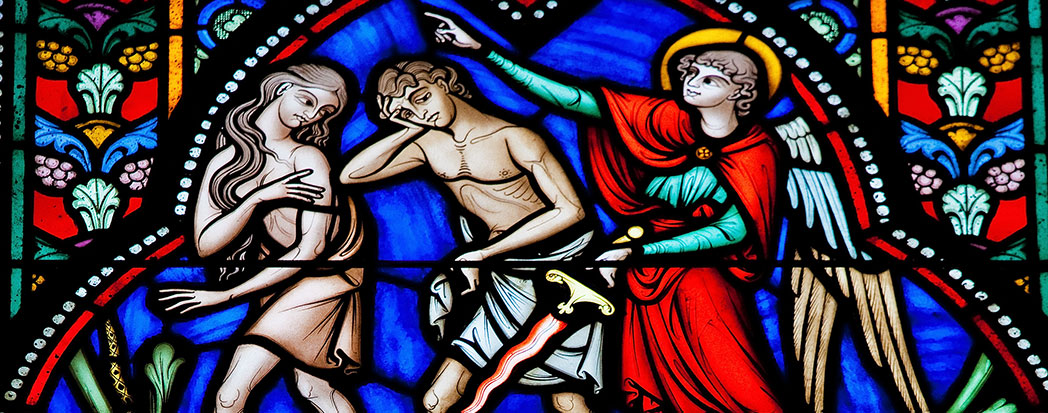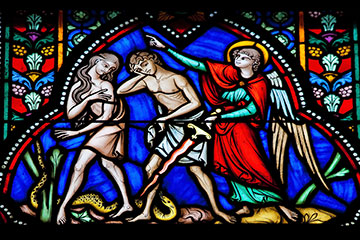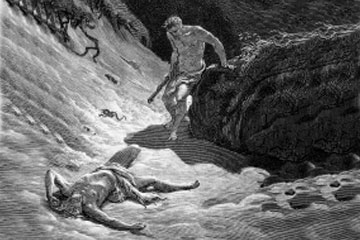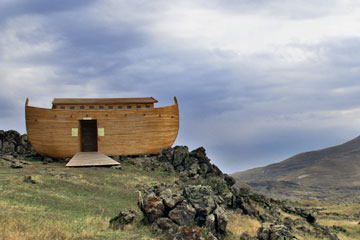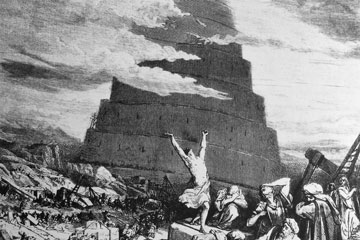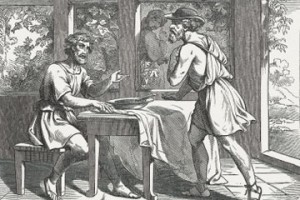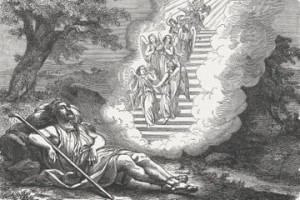Read the story in Genesis 2:7 - 3:24.
The Garden of Delight
The Parable of Adam and Eve takes place in the Garden of Eden. If we know that Eden is simply the Hebrew word for “Delight” we can easily see that the Garden of Delight is no more a literal place than the Slough of Despond or the Pit of Despair.
The Lord often uses trees, gardens and fields of crops to picture different kinds of people or different ways of thinking. There is no reason to think He is talking about literal plants at those times. In Jotham’s Parable of the Trees, all the trees gather and ask the olive tree to be their king (Judges 9:7-15). No one thinks those were literally talking trees.
Now in the Garden of Eden were two trees, but what kind? Apple trees have apples, fig trees bear figs, but what kind of fruit might we find on a Tree of Knowledge or a Tree of Life? In fact the story says that the Tree of Knowledge might give one knowledge (Genesis 3:5-6), while the Tree of Life gives eternal life (Genesis 3:22). Can anyone imagine that such trees in such a garden could be found anywhere but in the human mind?
Adam
And it is in this garden that we find Adam and Eve. In English transliteration those sound like names of ordinary people, but in Hebrew Adam is the word for “human” or “humankind.” It’s much like the medieval morality plays where the main character was named “Everyman.” The story goes, “In the day that God created Adam, He made him in the likeness of God. He created them male and female, and blessed them and called their name Adam in the day they were created” (Genesis 5:2). “He created them male and female, and blessed them and called their name Adam.” The story could hardly be more clear that “Adam” means multiple people, not one individual. Translating “Adam” literally as “Humankind” also supports this point: “In the day that God created Humankind... He created them male and female...and called their name Humankind.” Very clearly, the literal meaning itself shows us that Adam is not just one individual, but the likeness of God that is in every human being. One translation says “the whole human race” where the Hebrew is Adam (The Message, Genesis 5:2).
Adam or “Humanity” was formed from the dust of the ground (in Hebrew, “Adamah”). Adam from Adamah means Human from Humous. The Lord says, “Look, as the clay is in the potter’s hand, so are you in My hand” (Jeremiah 18:6). We are the clay, and the Lord our potter; And all we are the work of His hand (Isaiah 64:8). Of course, we are not literally clay, nor was Adam; but the Lord is moulding all of us into His own likeness if we allow Him to do so.
The Rib
The Lord saw that it is not good for the Human to be alone, and makes a helper suited to him. He does it by taking a rib from the Human and building it into a wife. The idea of taking away the rib (a hard, relatively lifeless bone close to the heart) and putting flesh in its place may remind us of the valley of dry bones Ezekiel saw in a vision (Ezekiel 37). “Can these bones live?” the Lord asks; “Surely I will cause breath to enter into you, and you shall live. I will put sinews on you and bring flesh upon you, cover you with skin and put breath in you; and you shall live. Then you shall know that I am the Lord” (Ezekiel 37:5-6).
It’s not talking about literal bones. “These bones are the whole house of Israel. They indeed say, ‘Our bones are dry, our hope is lost, and we ourselves are cut off!’ Therefore prophesy and say to them, ‘Thus says the Lord God: “Behold, O My people, I will open your graves and cause you to come up from your graves, and bring you into the land of Israel (Ezekiel 11-12). The Lord obviously is not talking about putting literal flesh on literal bones, but taking something relatively lifeless, hard and dry, and making it into something living, breathing and beautiful. And this is what the Lord does with every part of our lives, if we let Him. We might feel that our marriage is dry and lifeless, or that we have a dead-end, hopeless job, or that religion is a bunch of meaningless rules, or that the Bible or the Writings are old, dry books without life or movement in them. And of course, it is not the marriage, the career, the religion or the revelation that is dead but there is something in us that is dead and fails to respond to the life, purpose and joy that the Lord constantly offers. It’s not bones out there, but something selfish and hard that is in us, close to our heart.
In Adam, that is, in all humanity, the Lord took out a hard lifeless rib and put flesh in its place. In Jeremiah we find something similar: “And I will give you a new heart, and a new spirit I will put within you, and I will take the heart of stone out of your flesh and I will give you a heart of flesh.” The Lord is promising to take away the selfishness, indifference and cruelty that leads us to be sarcastic with a coworker, overbearing with a child or contemptuous with a neighbor. In its place He will put a heart of flesh: compassion, forgiveness, kindness and service.
In marriage in particular the rib of the Man can symbolize the male ego, the self-righteousness and pride that whatever opinions he holds close to his heart are right and good. As a rib protects the heart, a man protects his heart with these opinions, but they hard and without life. There is a saying (and book title), “You can be right, or you can be married.” As the teachings for the New Church put it, a man can’t love his own opinions and his wife, so taking away the Man’s rib and giving him a Wife instead is a process of taking away a man’s high opinion of himself and replacing it with vulnerability, humility and true married love.
On another level remember that Adam means all people, male and female, so women, too, have a choice between being right and being married. Women, too, must let the Lord take away the heart of stone, the rib, the need to be right, and replace it with compassion and selfless married love.
Adam and Eve as the Lord and the Church
The name Eve means “Alive” or “Living One.” Knowing the meaning of the name makes it easy to see Eve means something that comes alive in each one of us. She was said to be the mother of all who are living (Genesis 3:20). Paul says that the mother of us all is the (New) Jerusalem (Galatians 4:45). The New Jerusalem is the Bride and wife of the Lord (Revelation 21), described also by the Woman Clothed with the Sun, who is called the mother of “those who keep the commandments of God and have the testimony of Jesus Christ” (Revelation 12:17). According to Paul the marriage of Adam and Eve is a great mystery concerning Christ and the church (Ephesians 5:32).
Though we have said that Adam means all human beings, on the deepest level there is One who is Human more than anyone else: Jesus Christ, the Divine Human, the God-Man in whose image all humans are created.
On this level Eve, the Church, is all people who receive life from the Lord. The Lord forms the church from His own “flesh” and “bones.” The Lord takes from Himself His own Wisdom, contained in His Word, and builds it into the beautiful and living Bride of the Lamb. By itself the Word may seem lifeless and hard as a bone, but it is transformed: like Ezekiel’s bones it gains sinews, flesh and spirit when we live by its teachings.
Yes, Adam was asleep when this transformation took place, just as Jesus was asleep in the boat while it was tossed by the tempest. The Bible says “God rested” (Genesis 2:2, 3; Exodus 20:11; 31:17; Deuteronomy 5:14; Hebrews 4:4, 10) and “awoke out of sleep” (Psalm 44:23;78:65), when in fact the Lord “neither faints nor is weary” (Isaiah 40:28) and “neither slumbers nor sleeps” (Psalm 121:4). The Lord’s sleeping is symbolic of our feeling that the Lord is absent and unconscious of our trials. The reality is that He is then closer than we can possibly believe. But it is only through this sleep or this feeling that we have been left on our own that we can have a sense of independence or the heavenly feeling that the life He gives us is our life.
You see, the story of Adam’s Rib is the story of the Lord’s Word. The story itself is hard to understand and without life or meaning when we take it literally, but seen as a parable containing a deeper meaning it is transformed into something living and beautiful when we live by what it teaches, when we let go of selfishness and pride and accept the Lord’s life, when He takes the heart of stone out of our flesh and gives us a heart of flesh.

